Putting the Pieces Together
Nigeria’s Deep Blue Project Integrates Air, Land and Sea Assets to Secure the Nation’s Maritime Domain
ADF STAFF | PHOTOS BY NIMASA
As 2021 drew to a close, the once-perilous waters off Nigeria’s coast were showing signs of becoming uncharacteristically calm. In fact, the entire Gulf of Guinea region had shown a steady decrease in pirate attacks and armed robberies.
From Senegal to Angola, the actual and attempted incidents had fallen from 82 in 2018 to just 35 in 2021. For Nigeria, which has long had some of the most dangerous territorial waters in West Africa, the news also was promising.
Actual and attempted incidents off Nigeria’s coast had dropped precipitously from 48 in 2018 to just six in 2021, according to the International Maritime Bureau (IMB).
However, complacency has not taken hold in Nigeria. “We are not sleeping,” Bashir Yusuf Jamoh, director-general and CEO of the Nigerian Maritime Administration and Safety Agency (NIMASA), told ADF.
In fact, Nigeria is wide awake.
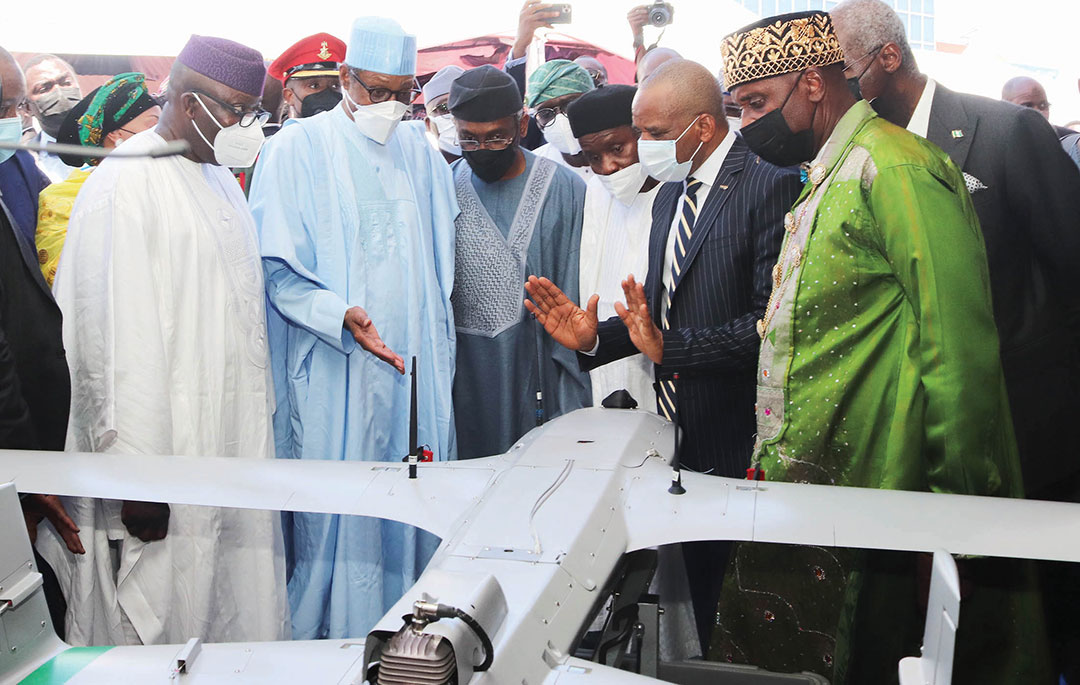
As the threat of international maritime crime, including piracy, oil theft, drug trafficking and illegal fishing, persists, Nigeria is responding with the Integrated National Security and Waterways Protection Infrastructure, also known as the Deep Blue Project.
The project, recognizing connections between land- and sea-based criminal elements, knits together coordinated air, land and sea assets for a comprehensive view of the maritime domain.
“The presence of the Deep Blue Project sent very good signals to those criminals to know that we are now fully ready for them,” Jamoh said.
THE PROJECT’S COMPONENTS
The equipment and personnel committed to the $195 million Deep Blue Project are significant. Air, land and sea assets will work together to acquire, consolidate, analyze and share information for effective maritime security.
The project relies on civilian and military cooperation. For example, NIMASA is a civilian agency that focuses on security for commercial vessels, maritime labor regulation, pollution prevention and control, shipping registration, and training and certification of seafarers, among other things.
The Nigerian Navy is responsible for securing and protecting territorial waters. For that reason, the Navy staffs Deep Blue sea assets. Air Force personnel will do the same for air assets.
Jamoh, as NIMASA director-general, directs the project, and the agency provides logistics and management support.
The air component consists of two special-mission Cessna CJ3 Citation jets equipped with multimode radar, a satellite communication system, an operator workstation and a 10-person crew capacity. There also are three helicopters and four sets of three unmanned aerial vehicles. On the water, Deep Blue will deploy two special-mission vessels — DB Lagos and DB Abuja — and 17 interceptor boats. Finally, land equipment consists of 16 armored vehicles and 600 Navy special forces personnel.
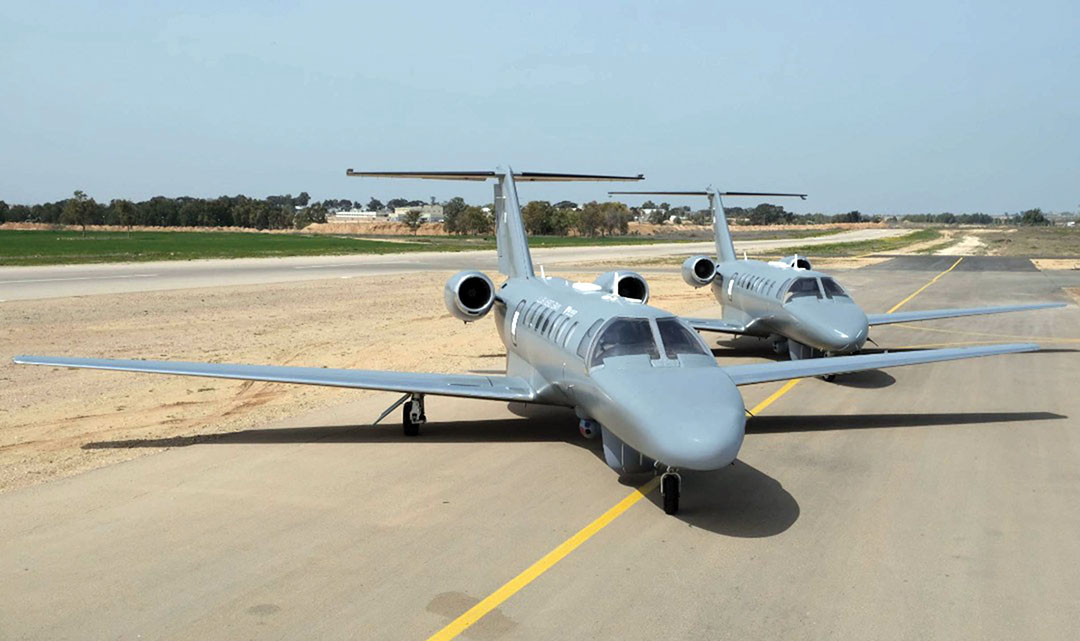
As of early May 2022, all but 10 of the interceptor boats and eight armored vehicles had been received, Jamoh said. Air Force personnel were expected to complete training by the end of May. All 600 land-based Navy special forces personnel and the sea-based personnel have been trained. NIMASA expected the Deep Blue Project to be fully equipped and operating by mid-June 2022.
One part of the land-based component is the Command, Control, Communication, Computer and Intelligence Centre (C4i). “That is the brain behind the Deep Blue Project,” Jamoh said.
As land, sea and air personnel observe the maritime space, they collect data, which is fed to the C4i by satellite. The center’s staff includes NIMASA, Navy, Army, police, civil defense and Air Force personnel.
“The men that control the center now control the information data and send it to the appropriate channels,” Jamoh said. “The C4i center works with the satellite system and coordinates the entire operations in the situation room. That situation room has the computers, and has the control and has the communication system that can transmit to the land, air and the sea operations.”
So, for example, a patrolling plane could observe a problem at sea, transmit the information to C4i and have interceptor boats dispatched to investigate. At the same time, C4i coordinates with other authorities, such as the IMB, to share data and coordinate assistance in areas that Deep Blue assets cannot access.
LAW BRINGS ORDER
Equipment and technology are valuable, but there is more to maritime security than personnel, gadgets, intelligence, planes and ships. To have a lasting effect, assets must be backed by effective laws that help nations such as Nigeria ensure that arrests lead to effective prosecutions in court, and, if necessary, incarceration.
That is why part of Nigeria’s success is embodied in the Suppression of Piracy and Other Maritime Offences (SPOMO) Act, which President Muhammadu Buhari signed into law in June 2019. In the past, many nations were forced to release pirates and thieves after capture because they had no effective laws under which to prosecute them.
Jamoh told ADF that the law has been effective. Since its inception, Nigeria has successfully prosecuted 20 criminals under the law, with all of them getting prison sentences.
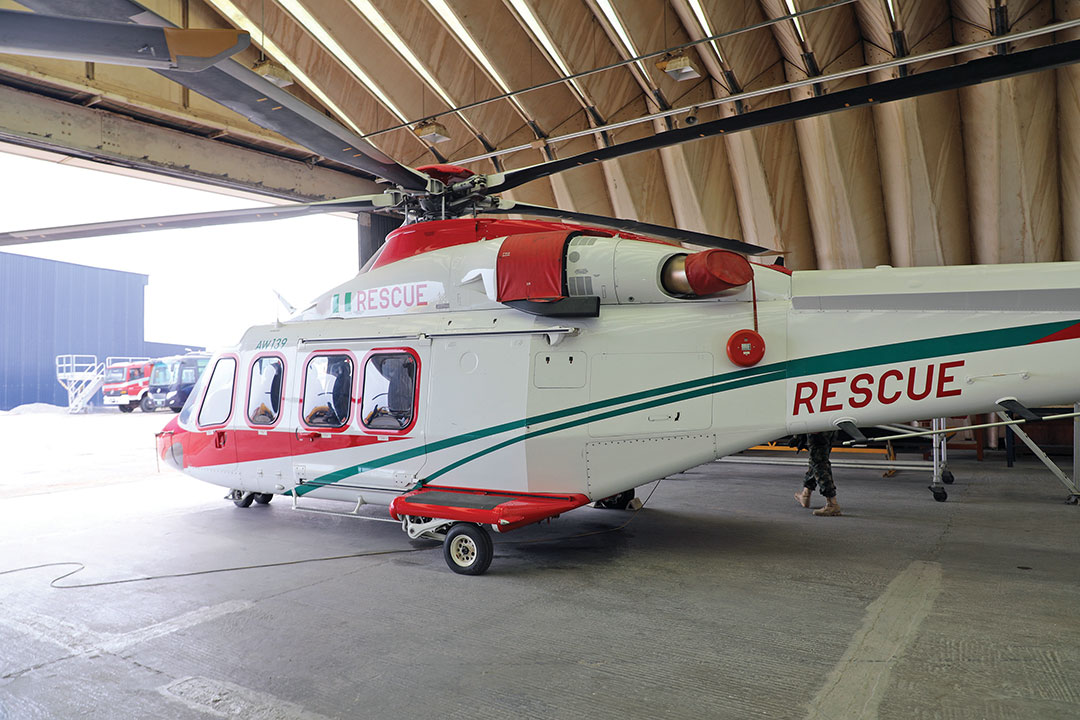
In fact, the law first was used to successfully prosecute 10 pirates in the case of the Hailufeng 11, a Chinese-flagged vessel attacked on May 15, 2020, in Ivoirian waters. The pirates turned off the vessel’s automatic identification system, which broadcasts location, leaving authorities to manually plot the ship’s location.
As the vessel passed through Ghanaian, Togolese and Beninese waters, authorities exchanged information until it reached Nigerian territorial waters. At that point, the Nigerian Navy Ship Nguru pulled alongside the boat about 140 nautical miles south of Lagos, and Sailors boarded it and subdued the pirates.
According to a July 23, 2021, report in The Maritime Executive, the 10 pirates each were sentenced to 12 years in prison and ordered to pay fines.
“That particular law changed the risk-reward calculus for piracy in Nigeria,” said maritime expert Ian Ralby, CEO of I.R. Consilium. Other regional nations with similar laws also began to try cases, changing the dynamic for organized criminal groups in the region.
In the past, there was little fear of getting caught, much less prosecuted, but now “all of a sudden there’s a risk that not only you, but your entire network, may end up getting in trouble for it, with some serious consequences of going to jail for a very long time, that changes the risk tolerance for piracy,” Ralby told ADF. “So I think that combination of procurement and prosecution has had a significant effect.”
‘STICK AND CARROT APPROACH’
The potential for punishment often is best contrasted with an attractive opportunity to avoid prosecution. Jamoh calls it the “stick and carrot approach.”
Deep Blue and the SPOMO Act constitute the “stick.” The “carrot” consists of an effort to provide opportunities to young people who might otherwise be enticed to join illicit maritime networks that participate in piracy, theft or illegal fishing.
In October 2021, Nigeria selected 200 young people to send for training at maritime institutions in India, Greece, the Philippines and the United Kingdom. The effort is part of the third phase of the Nigerian Seafarers Development Programme (NSDP), according to The EyeWitness News, a Nigerian online news site.
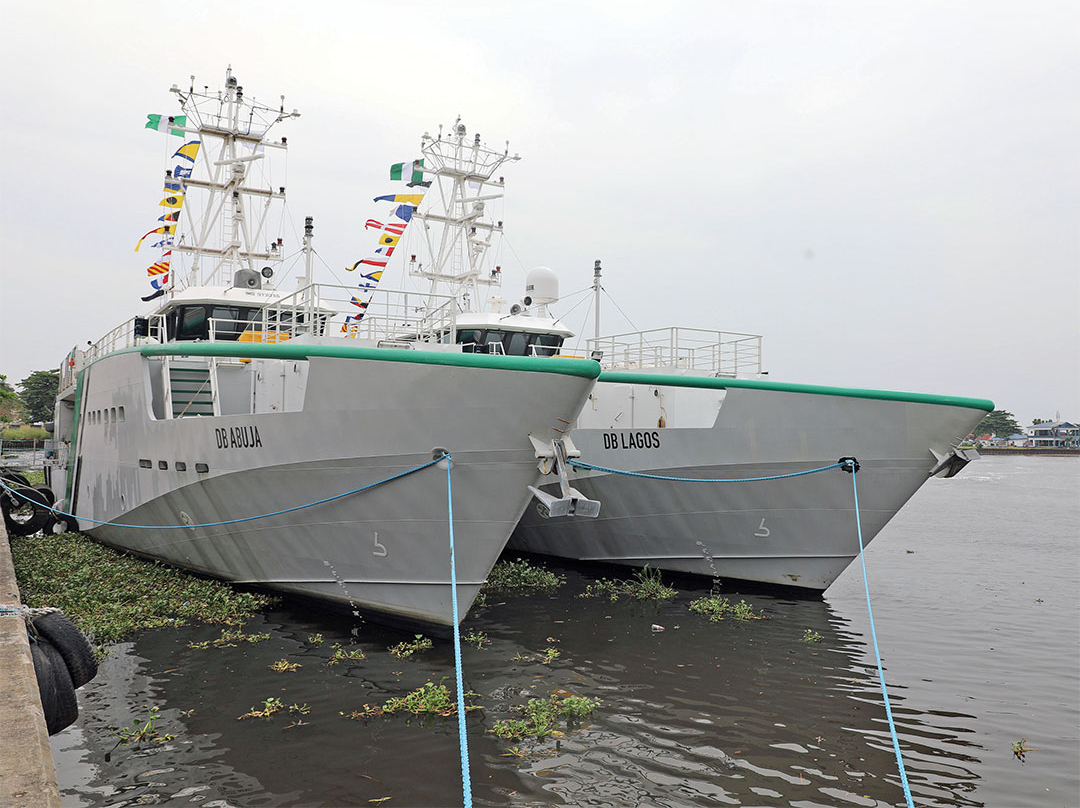
The NSDP, which NIMASA manages, was established in 2008 to train people ages 17 to 22 in practical and theoretical skills at maritime institutions around the world to build a pool of capable seafarers, Jamoh wrote for Nigeria’s The Guardian newspaper.
“The aim is for us to see that we keep the children, those idle children, away from the streets … so that they can have something to do instead of them looking at the maritime business as a source of making illegitimate wealth,” Jamoh told ADF.
Students who come back to Nigeria will be trained to help “reposition the country for the Blue Economy that is being championed by NIMASA, which is aimed at diversifying the national economy,” Jamoh wrote.
STAYING VIGILANT
Despite a relatively quiet 2021 in the Gulf of Guinea, one incident in 2022 underscored the continued need for maritime security vigilance. In early April, pirates boarded the cargo ship Arch Gabriel 278 miles south of Lomé, Togo, as it idled, presumably waiting for its next contract. It was the first such boarding attack in the region in more than three months.
The Maritime Executive reported that crew members sought refuge in a citadel room and that after several hours, the pirates left the vessel, which is registered in the Marshall Islands. An Italian Navy ship secured the Arch Gabriel and escorted it to Nigerian waters, where another vessel escorted it to Lagos.
By the second half of 2022, Nigeria is expected to have all of its equipment, personnel and training in place under the Deep Blue Project. The project is expected to increase security in Nigerian territorial waters. But experts warned against complacency.
“The IMB welcomes all initiatives designed to enhance maritime security in the region,” Michael Howlett, director of the IMB, told ADF in an email. “The Deep Blue Project is a positive initiative, but it needs to take leadership, liaise and cooperate with other regional initiatives to ensure the waters of the Gulf of Guinea are safe for innocent seafarers and trade.”
Nigerian authorities are mindful that their increased capacity could push maritime criminals into the waters of neighboring countries, such as Benin or Cameroon. It has happened before. In 2013, the navies of Benin and Nigeria joined in Operation Prosperity. Headquartered in Cotonou, the bilateral effort gave Nigerian vessels permission to enter Beninese waters to enforce maritime security.
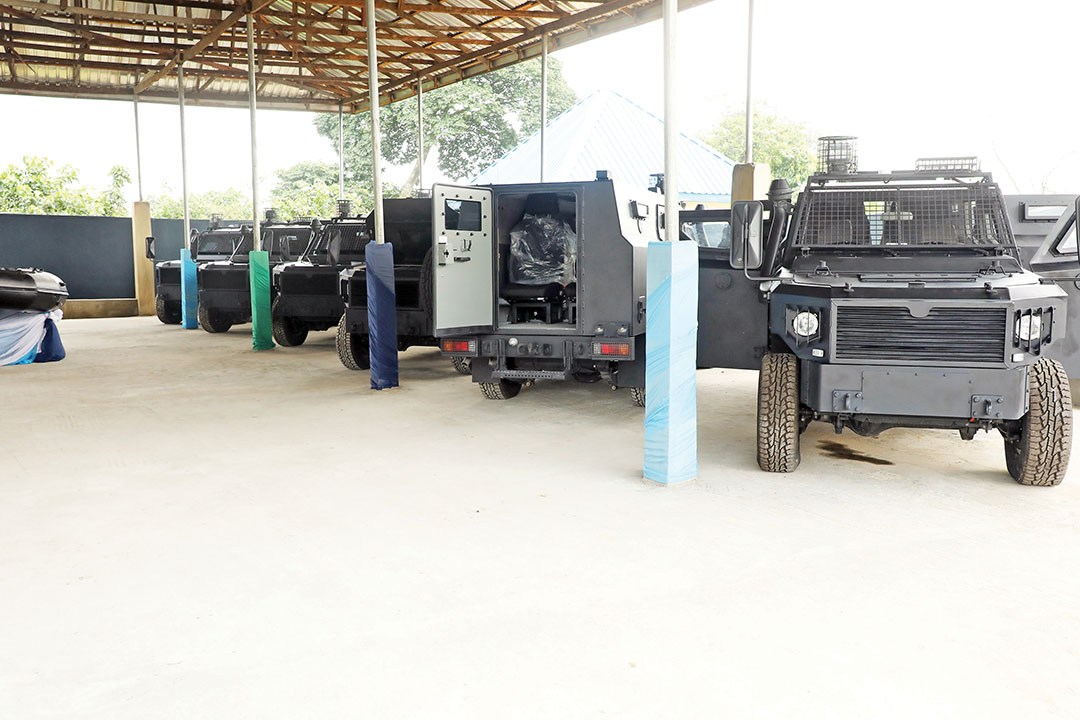
Rear Adm. Boniface Konan, former acting director of the West Africa Regional Maritime Security Centre in Abidjan, Côte d’Ivoire, told ADF by email that neighboring nations “can capitalize [on] Nigeria’s achievements through sharing of information, best practices and cooperation.”
The Yaoundé Code of Conduct, signed in 2013, which set up maritime zones along West Africa’s coast, helps do that. Nigeria is part of Zone E, along with Benin, Niger and Togo. Konan said a memorandum of understanding signed in 2018 by those nations is being acted on now, which allows for joint patrols among the nations’ waters.
A bilateral agreement between Cameroon and Nigeria also would help, as would similar legal processes across the zone, Konan said.
Nigeria also will try to improve knowledge and cooperation across the region with the establishment of a regional maritime security and safety training center that will open in Lagos in 2022 and eventually move to Delta State, Jamoh said. The center will attempt to examine the maritime security terrain to identify common elements of regional crime and help countries form effective responses. Nigeria’s interest is not just security in its own territorial waters, but for its neighbors as well, Jamoh said.
“If Ghana is not free, Nigeria will not be free,” Jamoh said. “If Nigeria is not free, Togo will not be free.”

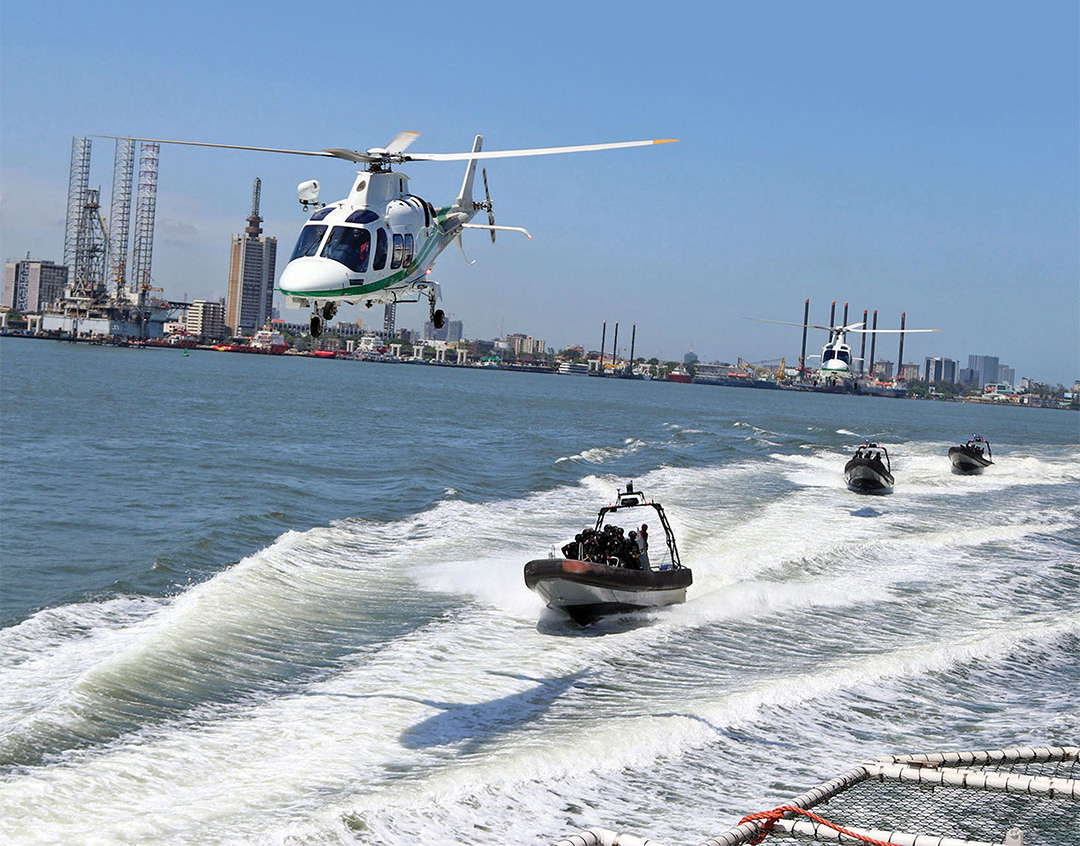
Comments are closed.